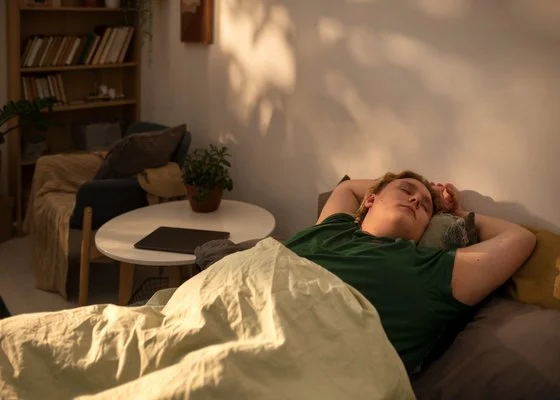Can Sleep Hygiene Help In Treating ADHD Symptoms?
Struggling with focus, impulsivity, or energy crashes during the day? If you’re living with ADHD, your sleep might be playing a bigger role than you think. Many people with ADHD face challenges falling asleep, staying asleep, or waking up refreshed, which only worsens symptoms like inattention and mood swings.
The encouraging news is that better sleep hygiene can lead to noticeable improvements. Simple changes like keeping a consistent bedtime, avoiding screens before sleep, and building a calming nightly routine can support your brain’s ability to recharge. I’ve seen how these habits can make a real difference for people managing ADHD, and it starts with just one small change tonight.
Disclaimer: This article is intended for educational purposes only and does not offer a medical diagnosis. If you’re dealing with ongoing sleep issues like persistent insomnia or snoring, it’s important to consult a doctor or healthcare provider to check for any underlying conditions.
Why Sleep Hygiene Matters for Managing ADHD Effectively
Taking care of your sleep starts with understanding what sleep hygiene actually means. It refers to the habits, routines, and environment you create around bedtime. These choices can either support deep, restorative sleep or contribute to the kind of restlessness that leaves you feeling drained the next day.
Sleep hygiene plays a major role in how well your brain and body function. Just like daily hygiene keeps your physical health in check, quality sleep practices help regulate your mood, attention, and energy levels. For people with ADHD, poor sleep hygiene can lead to increased inattention, irritability, and emotional dysregulation.
Because ADHD often comes with heightened sensitivity to changes in routine or sleep cycles, maintaining solid bedtime habits becomes even more essential. Building a consistent sleep schedule, limiting stimulation before bed, and creating a calming wind-down routine can significantly reduce sleep-related challenges. These small shifts may not feel dramatic right away, but they can have a powerful impact on how you manage ADHD symptoms over time.
A Step-by-Step Approach to Improving Sleep with ADHD
Improving your sleep does not require a complete life overhaul. For people with ADHD, starting small and building gradually can lead to stronger, more lasting habits. Focusing on what already works and adding new changes one at a time helps reduce stress and increase follow-through. The strategies below will help you create a realistic plan for better sleep by using what is already going well and making changes that support long-term success.
Celebrate What You’re Already Doing Right
Before you dive into making changes, take a moment to recognize what’s already working. Identifying your current positive habits can boost motivation and help build momentum.
Here are a few habits you may already be doing right:
Avoiding caffeine or alcohol close to bedtime
Maintaining a fairly consistent sleep and wake time
Keeping your bedroom quiet, cool, and dark
Avoiding heavy meals late in the evening
Creating a wind-down routine before bed
Acknowledging these wins makes the process feel less overwhelming and more achievable. It shifts your mindset toward progress rather than perfection. As you identify what’s working, you can direct your energy toward the specific areas that actually need change.
Pinpoint the Habits That Need Adjustment
Now that you’ve highlighted your strengths, it’s time to explore what’s not serving you. Take an honest look at your current sleep habits and routines to spot patterns that might be contributing to poor rest. Even small disruptions can have a significant impact on sleep quality over time.
Here are some examples of common sleep disruptors to look for:
Using screens too close to bedtime
Staying up late without a consistent routine
Engaging in stimulating activities before bed
Drinking sugary or caffeinated beverages at night
Sleeping in an environment that’s too bright or noisy
By identifying what isn’t working, you’ll be better equipped to make meaningful improvements. Focus first on the habits that feel most manageable to change or those that have the biggest negative effect. This approach helps keep your goals realistic and your efforts purposeful.
Focus on One Habit at a Time
Trying to change everything at once can be overwhelming, especially when managing ADHD. Success comes from choosing just one habit to adjust and committing to it for a few weeks. This helps your brain ease into the new routine without unnecessary stress.
Keep these principles in mind as you get started:
Select one small habit that feels achievable
Practice it consistently for at least three to four weeks
Avoid introducing new habits until the first one sticks
Use tools like habit trackers or reminders to stay on track
Celebrate small wins to keep your motivation high
Once that single habit becomes second nature, then you can move on to the next. Taking it step-by-step prevents burnout and supports long-term change. Over time, these gradual changes build momentum and lead to more lasting improvements in your sleep hygiene.
Stick With One Change Until It Feels Natural
The temptation to rush through multiple changes is real, especially when you're eager for better sleep. But lasting progress comes from giving each new habit time to fully settle into your routine. That means focusing on just one improvement at a time.
Here’s what to keep in mind as you build momentum:
Commit to one change for at least three to four weeks
Track your consistency with a journal or simple checklist
Avoid stacking new habits until the first one feels automatic
Adjust your expectations and allow room for trial and error
Recognize when the habit no longer takes mental effort
This method keeps the process manageable and your efforts more effective. Each habit you build lays a stronger foundation for the next. With this steady rhythm, long-term change becomes both realistic and rewarding.
Consistency Turns Practice Into a Habit
Research shows it takes around 28 days for a behavior to become automatic. That means repeating your new sleep habit daily until it feels effortless. Skipping steps or rushing through the process often leads to setbacks and frustration.
Here are ways to strengthen consistency while forming new habits:
Create a nightly routine that supports your chosen habit
Use the same cues each night to reinforce behavior
Avoid skipping days, even on weekends
Keep your expectations realistic and flexible
Revisit your motivation when commitment feels difficult
Give your body and brain time to fully adopt each new practice. Consistency doesn't just help with habit formation; it builds confidence in your ability to stick with positive routines. The more committed you are to the process, the greater the long-term impact on your ADHD management.
Simple ADHD Sleep Strategies That Actually Work
Improving your sleep does not require a complete life overhaul. For people with ADHD, starting small and building gradually can lead to stronger, more lasting habits. Focusing on what already works and adding new changes one at a time helps reduce stress and increase follow-through. The strategies below will help you create a realistic plan for better sleep by using what is already going well and making changes that support long-term success.
Create a Dark, Quiet, and Cool Sleep Environment
Environmental factors have a powerful effect on sleep, especially for individuals with ADHD who are sensitive to noise and light. Bright lights or background noise can keep the brain alert, making it harder to relax and fall asleep. That’s why sleeping in a dark, quiet room is one of the most effective ways to support deep rest.
There are practical tools to help create this kind of space:
Black-out curtains to block outside light
White noise machines or earplugs to reduce sound disturbances
Eye masks and fans to maintain darkness and regulate temperature
A slightly cooler room also promotes deeper sleep and reduces night wakings. Using a fan can help drop the room temperature and keep it consistent through the night. These small adjustments can make a significant difference in sleep quality over time.
Limit Screen Use Two Hours Before Bed
Screens are one of the biggest disruptors of healthy sleep, especially for those with ADHD. They stimulate the brain and interfere with melatonin production, which is essential for helping your body know when it's time to sleep. The artificial light from phones, TVs, and tablets sends signals to your brain that delay the natural sleep cycle.
Here are simple steps to reduce screen exposure before bed:
Turn off all screens at least two hours before sleeping
Switch to non-digital wind-down activities like reading or journaling
Use blue light filters in the evening if screen use is necessary
Replacing screen time with calming habits helps your brain transition into sleep mode. This gives your body a chance to reset its natural rhythm without stimulation. Over time, this shift can help you fall asleep faster and sleep more soundly.
Avoid Caffeine After 2 PM to Protect Sleep
Caffeine remains in your system for hours and can significantly interfere with sleep if consumed too late in the day. People with ADHD often process stimulants more slowly, making it harder to wind down when bedtime rolls around. Even a small amount of afternoon caffeine can delay your ability to fall asleep at night.
To avoid disrupting your sleep, keep these caffeine guidelines in mind:
Skip coffee, tea, soda, and chocolate after 2 PM
Check hidden sources of caffeine, such as medications or supplements
Replace afternoon caffeine with herbal teas or water
Cutting off caffeine early helps your body transition more easily into rest. Making this a regular part of your routine can lead to more predictable and refreshing sleep. It’s a simple change that can have a strong impact on your ability to unwind.
Say No to Late Afternoon Naps
While naps can be helpful, timing matters a lot. Napping too late in the day can throw off your body’s internal clock, especially for people with ADHD who may already struggle with irregular sleep cycles. Even short naps in the late afternoon can leave you feeling wired at bedtime.
To nap smart and avoid disrupting your nightly rest, try this:
Keep naps under 30 minutes
Schedule naps before 2 PM
Avoid napping if you’re already struggling to fall asleep at night
Being strategic about naps can protect your natural circadian rhythm. Consistency in your sleep-wake cycle is key for regulating energy and focus. Save naps for earlier in the day and use nighttime for your deepest rest.
Use Tools to Block Out Distractions
When complete silence or darkness isn’t an option, external tools can make a major difference. ADHD often comes with heightened sensitivity to sensory input, which means even minor distractions can disrupt your rest. With the right tools, you can create an environment that mimics ideal sleep conditions.
Here are a few sleep-friendly tools worth trying:
White noise machines to mask background sounds
Eye masks to block out ambient light
Weighted blankets to support a calming, grounded feeling
These tools help reduce overstimulation and support more restful sleep. Experiment with what works best for your space and sensitivity levels. Over time, these strategies can help you build a more consistent and peaceful sleep experience.
Cool Temperatures Support Deeper Sleep
Temperature plays a surprisingly big role in sleep quality. Cooler environments help signal to the body that it’s time to rest, making it easier to both fall and stay asleep. A hot or stuffy room can lead to tossing, turning, and restless sleep.
Use these tactics to lower your room temperature at night:
Use a fan or open a window to improve airflow
Choose breathable bedding and lightweight pajamas
Set your thermostat to a comfortable, slightly cool setting
Sleeping in a cool space supports the natural drop in body temperature that happens as you fall asleep. It also reduces the chances of waking up in the night feeling overheated or uncomfortable. Adjusting your environment can have a powerful effect on the quality of your rest.
Practical ADHD Sleep Tips to Help You Wind Down and Rest Well
Improving sleep with ADHD starts with small, practical lifestyle changes that support how your brain and body naturally function. Many people with ADHD struggle with racing thoughts, overstimulation, or irregular routines that can make restful sleep difficult. Making a few intentional adjustments to your daily habits can create the structure and calm needed to fall asleep more easily and stay asleep longer. The strategies below focus on real-life changes that are achievable, sustainable, and ADHD-friendly.
Give Your Body Time to Digest Before Sleeping
Heavy meals late at night can interfere with your body’s ability to rest. As digestion slows during sleep, food that sits in the stomach can lead to discomfort, bloating, or restlessness. This discomfort can disrupt your sleep or make it harder to fall asleep in the first place.
To avoid this, aim to eat heavier meals at least two hours before bedtime. This allows your digestive system to do its job before your body shifts into rest mode. Lighter evening snacks like fruit or yogurt are easier on your system and less likely to interfere with quality sleep.
Skip Alcohol Before Bed for Better Sleep Quality
Alcohol might seem like a quick way to relax, but it does more harm than good when it comes to sleep. While it may help you fall asleep initially, it reduces the amount of deep and REM sleep your body needs to truly recharge. As a result, you may wake feeling groggy, irritated, or mentally foggy.
In the long term, alcohol also disrupts your emotional balance, which increases stress and anxiety. That added pressure can make it even harder to fall asleep the next night. Avoiding alcohol at least two hours before bed can help your brain and body rest more deeply and wake more refreshed.
Stick to a Consistent Sleep-Wake Schedule
One of the most effective ways to improve sleep is by going to bed and waking up at the same time every day. This consistency helps regulate your circadian rhythm, making it easier to fall asleep and wake up naturally. When your sleep schedule is stable, your brain and body know exactly when to power down and recharge.
A regular sleep pattern also reduces brain inflammation, which is often experienced as brain fog or mental fatigue. With better sleep regulation comes improved focus, mood, and stress management. As your body learns when to expect rest, it will become easier to fall asleep and stay asleep through the night.
Make Small Adjustments That Add Up Over Time
Sleep quality often improves through a series of small, intentional changes rather than one big fix. Consistently applying strategies like exercise timing, limiting alcohol, and sticking to a schedule can make a big impact. Each positive habit reinforces the next, building momentum toward healthier sleep patterns.
Over time, these actions become easier and more natural. Your body starts to anticipate rest, your brain settles more quickly, and your energy improves throughout the day. With each new adjustment, you're building a stronger foundation for long-term sleep success.
Boost Sleep Naturally by Exercising During the Day
Physical activity during the day helps burn excess energy, making it easier to wind down at night. Movement also triggers the release of endorphins, which improve mood and emotional balance. When your emotions feel more stable, it becomes easier to relax and fall asleep without racing thoughts.
This emotional regulation is especially important for individuals with ADHD, as anxiety and restlessness can be common sleep barriers. Exercise provides a healthy outlet for that energy and reduces stress levels naturally. Even light daily movement, like walking or stretching, can make a noticeable difference in sleep quality.
Time Your Workouts to Avoid Sleep Disruption
While daytime exercise supports sleep, intense activity close to bedtime can do the opposite. Vigorous exercise raises your heart rate and body temperature, which can leave you feeling wired instead of relaxed. It may even activate the body’s stress responses, making it harder to calm down afterward.
To support better rest, follow this timing tip: finish any high-intensity workouts at least two hours before bed. This gives your body time to regulate itself and transition back to a calmer state. Choosing gentle evening activities like yoga or stretching can offer the movement benefits without interfering with your sleep.
Why Sleep Is So Hard with ADHD and How to Improve It
Improving sleep when you’re living with ADHD or autism involves more than just setting an earlier bedtime. Real neurological patterns, sensory sensitivities, and emotional demands can make standard sleep advice feel frustrating or even impossible. The good news is that there are practical, compassionate strategies that take these differences into account. Below, you’ll find realistic tips and routines to help you create better sleep habits in a way that actually works for your brain and your life.
Acknowledging Vulnerabilities and Building a Gentle Sleep Strategy
It’s important to recognize that sleep challenges are not a personal failure, but a reflection of real neurological and emotional hurdles. Understanding your specific sleep disruptors can help you approach change with clarity instead of frustration. Being kind to yourself allows for growth without added pressure. Focusing on progress rather than perfection will make your routine more sustainable and realistic.
Helpful ways to support yourself include:
Practicing patience and self-kindness during setbacks
Identifying consistent triggers that affect sleep
Using flexible approaches based on your daily needs
Revisiting strategies when stuck in a rough cycle
Biological and Sensory Barriers That Disrupt Rest
Not all sleep struggles are behavioral; some stem from biological differences and sensory processing issues. Melatonin rhythms and circadian cycles may not align with conventional expectations for sleep and wake times. Interoception difficulties can make it hard to notice hunger, thirst, or pain until those signals become overwhelming. These internal factors can quietly interfere with a restful night.
Some common internal barriers include:
Disruptions in melatonin and circadian rhythm
Difficulty sensing body needs like hunger or fatigue
Physical discomfort from light, noise, or texture
Miscommunication between the body and brain during rest cues
Why Sleep Hygiene Is Often Challenging to Maintain
For many people with ADHD or autism, sticking to a sleep routine can feel like an uphill climb. The struggle is not due to lack of effort, but often because our brains and bodies resist consistency in ways we can't always control. Emotional exhaustion from daily stimulation can also leave us feeling drained by bedtime routines. This makes it difficult to build momentum or follow traditional sleep advice.
Key reasons why sleep hygiene may be difficult:
Tendency to delay sleep as a way to reclaim time
Falling into hyperfocus that disrupts awareness of time
Biological patterns that do not align with routine
Physical or emotional exhaustion that reduces motivation
Evening Habits That Undermine a Good Night's Sleep
Late-night routines often feel like a relief after busy, overstimulating days, but they may be keeping you awake longer than intended. Engaging in high-stimulation activities or eating heavy meals too late can signal your body to stay alert. These choices, although comforting in the moment, often have lasting effects on your sleep quality. Adjusting these habits can help create a more restful night without removing your alone time completely.
Habits to keep an eye on include:
Scrolling or watching screens close to bedtime
Eating large meals late in the evening
Staying awake to enjoy solitude or hobbies
Getting caught in projects that delay sleep
Building a Transition Routine to Signal Sleep
One of the most effective ways to support sleep is creating a short, calming routine that tells your brain it's time to rest. This transitional period can help ease your nervous system out of daytime stimulation and into relaxation. You don’t need an elaborate ritual; just a few consistent actions can make a big impact over time. The key is to do these activities in the same order every night so they become part of your body’s internal clock.
Supportive transition activities can include:
Dimming the lights and lowering screen brightness
Reading, journaling, or stretching for 10 to 15 minutes
Using calming scents like lavender or eucalyptus
Practicing light breathing exercises or guided meditation
Creating a Sleep-Friendly Environment That Supports Your Needs
Sometimes our surroundings make it harder to rest, especially when we’re extra sensitive to noise, light, or temperature. A well-designed sleep space can reduce overstimulation and promote comfort, making it easier to fall asleep and stay asleep. Your bedroom should feel like a safe and calming place tailored to your specific sensory needs. Taking small steps to reduce discomfort can remove hidden barriers that interfere with rest.
Ways to improve your sleep space include:
Installing blackout curtains or using a sleep mask
Using earplugs or a white noise machine for sound control
Adjusting room temperature with fans or layered bedding
Removing clutter to reduce visual distractions
Recognizing Progress Without Chasing Perfection
Improving sleep hygiene is a process that rarely moves in a straight line, especially for neurodivergent individuals. It’s easy to feel frustrated when things don’t change overnight, but acknowledging your small wins is just as important as fixing what’s not working. Even partial improvements—like going to bed 15 minutes earlier or skipping one late-night snack—are valid steps forward. Sleep changes take time, and consistency will build over days and weeks.
Helpful ways to celebrate progress:
Journaling about sleep successes, even small ones
Noticing how your energy improves with small adjustments
Avoiding harsh self-criticism during tough nights
Reflecting on what routines helped, not just what didn’t
Conclusion
Improving sleep with ADHD is not about following a perfect routine, but about finding what works best for your needs. Small changes such as reducing stimulation, building consistency, and adjusting your environment can lead to meaningful results over time.
Understanding the obstacles that affect your rest gives you more control and confidence. With continued effort, flexibility, and a supportive mindset, better sleep becomes a realistic and sustainable goal. The more you tailor your routine to fit your brain, the more progress you are likely to see.
Frequently Asked Questions
Can ADHD medication affect sleep even with good sleep hygiene?
Yes, stimulant medications can make it harder to fall or stay asleep if taken too late in the day. Talk to your doctor about adjusting timing or dosage to minimize sleep disruption.
Is it normal for people with ADHD to feel more alert at night?
Many people with ADHD have delayed circadian rhythms, which can cause late-night energy spikes. Gradual schedule adjustments and dim lighting can help reset your sleep cycle.
Does diet play a role in how well someone with ADHD sleeps?
Absolutely. Balanced meals and avoiding sugar or caffeine late in the day can improve sleep quality and reduce evening restlessness.
Can melatonin supplements help with ADHD-related sleep issues?
Melatonin may support sleep for those with delayed sleep phases, which is common in ADHD. Always consult a healthcare provider to determine proper use.
What should I do if sleep hygiene strategies are not working?
If you’ve tried consistent strategies without success, consider speaking with a sleep specialist. Persistent sleep issues may indicate an underlying condition needing treatment.





